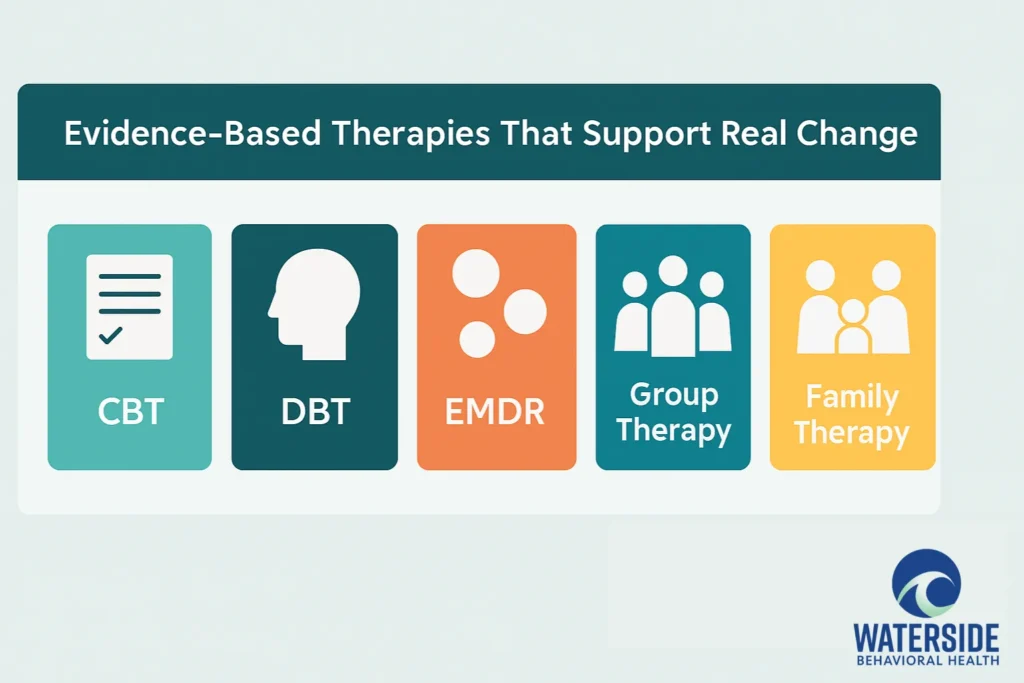The world of behavioral health treatment casts a wide net on care for mental health. There are many treatment centers and facilities that promise results and tout their methods as best practice. However, they’re just applying a cookie cutter approach to individuals in very nuanced situations. This is why, at Waterside BHC, we’re passionate about helping people through individualized treatment methods and different levels of care; it brings context into account and gives those participating the best chance at treatment success. For some individuals, they require a more relaxed approach like outpatient treatment; for others, intensive outpatient programs (IOPs) may be the best course of action.
Intensive outpatient programs (IOPs) for behavioral health are for those who need more intensive support but don’t require 24-hour supervision. IOPs offer comprehensive mental health and addiction services. These typically include individual and group therapy, psychoeducation, skill-building sessions, and sometimes medication management. These programs are designed to address a variety of behavioral health issues. This includes mental health disorders such as depression, anxiety, substance use, and trauma.
IOPs involve several sessions per week, ranging from three to five days, for a few hours each day; they allow participants to receive intensive support while gradually integrating coping skills into their everyday lives. The goal is to promote long-term recovery and resilience; IOPs give individuals the tools they need to manage their conditions and improve their overall quality of life.
What does IOP feel like? For one client’s perspective, read: “IOP at Waterside Was the First Time I Felt Seen.”
Intensive outpatient programs (IOPs) for behavioral health typically include several key components designed to support individuals in their mental health journey. Some of these components include the following:
The difference between standard outpatient treatment and Intensive outpatient programs for behavioral health lies in the level of care. Standard outpatient treatment typically involves less frequent sessions, often consisting of weekly meetings with a therapist or counselor; it focuses on addressing mental health or substance use issues in a more flexible and less structured manner.
Conversely, IOPs offer a higher level of care, providing several therapy sessions each week. This increased intensity allows participants to engage deeply with their treatment, develop essential coping skills, and receive a comprehensive support system; it also allows them to maintain some aspects of their daily lives, such as work or school.
All comprehensive treatment programs begin with an individual treatment plan. However most IOP programs have these features in common:
The main differences between partial hospitalization programs (PHP) and intensive outpatient programs (IOP) for behavioral health revolve around the following: the level of care, intensity, and daily structure. PHPs provide a higher level of care, typically involving full-day programming several days a week. This structure is ideal for individuals requiring more comprehensive support.
In contrast, IOPs offer a less intensive schedule, usually consisting of several hours of therapy a few days a week; this allows participants to engage in treatment while still managing daily responsibilities, such as work or school. While both PHP and IOP focus on providing structured therapeutic support, PHP is generally suited for individuals needing more intensive treatment; IOP is designed for those who require significant support but can maintain a degree of independence in their daily lives.
IOPs are particularly suited for those experiencing moderate to mental health conditions, such as major depressive disorder, mood disorders, post-traumatic stress disorder, bipolar disorders, anxiety disorders, borderline personality disorder, trauma, substance use disorders, or emotional dysregulation that impacts daily living. This program is also ideal for individuals transitioning from inpatient treatment who need ongoing support as they reintegrate into daily life. IOPs cater to a wide range of people, including adolescents, adults, and even families; they provide a flexible approach that accommodates participants’ work, school, or family commitments. IOPs help individuals develop essential coping skills, build a support network, and enhance their overall mental health and well-being with evidence-based therapy.
An intensive outpatient program isn’t just a higher dose of therapy—it’s a targeted, research-backed outpatient program designed to disrupt harmful patterns and rebuild emotional balance. For many clients, that includes addressing emotional dysregulation through structured behavioral therapy like DBT or CBT.
These therapeutic approaches:
Help regulate mood swings and impulsive behaviors
Improve communication and distress tolerance
Offer tools to support long-term functioning outside of crisis
For individuals with borderline personality disorder, these skills are life-changing. But even beyond diagnosis, clients dealing with co-occurring anxiety, depression, or trauma find these therapies help restore clarity, stability, and a sense of agency.
Importantly, IOP builds a support system around the client—from therapists and peers to family sessions and community referrals. This interconnected care model is what makes outpatient treatment sustainable over time.
Waterside Behavioral Health’s Intensive Outpatient Program (IOP) blends clinical structure with the flexibility to stay engaged in everyday life. Our treatment approach includes a range of evidence-based therapies tailored to your individual needs:
Cognitive Behavioral Therapy (CBT): Helps identify and reframe negative thought patterns that contribute to anxiety, depression, and other mental health challenges.
Dialectical Behavior Therapy (DBT): Builds skills in emotional regulation, distress tolerance, mindfulness, and interpersonal effectiveness.
Eye Movement Desensitization and Reprocessing (EMDR): A trauma-focused therapy that helps reprocess distressing memories and reduce their emotional impact.
Group Therapy: Fosters connection, accountability, and shared learning in a safe, supportive environment.
Family Therapy: Supports healing at home by improving communication, setting boundaries, and strengthening relationships.
Each of these therapies plays a vital role in creating a personalized path toward lasting stability and growth.
After the initial program duration, some participants may continue with additional sessions or transition to less intensive outpatient therapy. This is all dependent upon their progress and ongoing needs. The focus of IOPs is to provide adequate support to help individuals stabilize, develop coping skills, and prepare for transition.

When it comes to behavioral health, structure is what makes an outpatient program work. Unlike casual therapy, an intensive outpatient program offers a reliable routine—one that holds you accountable, builds skills, and creates momentum.
In structured care, you’re not just talking—you’re doing.
Behavioral therapy is delivered consistently, not sporadically
You build a support system that’s reliable and present
Daily or weekly rhythm helps stabilize symptoms from co-occurring disorders
You know what’s next, which reduces anxiety and prevents crisis-based care
A scattered schedule can leave gaps—especially for those managing depression, trauma, or co-occurring substance use. But a structured outpatient program keeps treatment active and relevant, even as you navigate work, school, or family responsibilities.
Structure doesn’t limit your life. It rebuilds it—on your terms, with real clinical support.
The duration of IOPs for behavioral health can vary based on individual needs and the specific program structure; they typically last anywhere from three to six weeks. Most IOPs require participants to attend sessions three to five days per week. Each session of IOP lasts around three to five hours, for a total of 15-25 hours per week. This flexible scheduling allows individuals to receive the care they need while still managing their daily responsibilities.
After the initial program duration, some participants may continue with additional sessions or transition to less intensive outpatient therapy. This is all dependent upon their progress and ongoing needs. The focus of IOPs is to provide adequate support to help individuals stabilize, develop coping skills, and prepare for transition.
Oxford Academic. “A systematic review of intensive outpatient care programs for high-need, high-cost patients.” academic.oup.com, October 2020 https://academic.oup.com/tbm/article/10/5/1187/5921055?login=false
Oxford Academic. “A systematic review of intensive outpatient care programs for high-need, high-cost patients.” academic.oup.com, October 2020 https://academic.oup.com/tbm/article/10/5/1187/5921055?login=false
“Stress in America 2023:A Nation Grappling with Psychological Impacts of Collective Trauma.” Apa.org, 2023, www.apa.org/news/press/releases/2023/11/psychological-impacts-collective-trauma#:~:text=Adults%20ages%2035%20to%2044.
Mental Health America. “Quick Facts and Statistics about Mental Health.” Mental Health America, 2022, mhanational.org/mentalhealthfacts.
In Massachusetts, Intensive Outpatient Programs (IOPs) for behavioral health are typically covered by insurance. Most major insurance providers recognize IOPs as a valid treatment option for individuals struggling with behavioral health and substance use disorders. However, coverage specifics can vary depending on the individual’s insurance plan. It is advisable for individuals seeking IOP treatment to contact their insurance provider directly to confirm coverage details. If you’d like to find out more, you can verify your insurance or give us a call.
The cost of Intensive Outpatient Programs (IOPs) for behavioral health in Massachusetts can vary widely based on several factors; this could include the specific treatment facility, the services offered, and whether the individual has insurance coverage. On average, without insurance, IOPs can range from $5,000 to $10,000. However, with insurance, the out-of-pocket costs can be significantly lower, depending on the individual’s coverage.
Waterside Behavioral Health is a renowned and accredited provider of an evidence based intensive outpatient program IOP located in Plymouth, Massachusetts. We offer a supportive and nurturing environment to help clients achieve their goals.
At Waterside Behavioral Health, we are passionate about providing individualized treatment options for those who need help. Behavioral health care is a long journey, and successful outcomes are largely dependent upon tailor-fit treatment methods; for some, this may mean pursuing intensive outpatient programs for their behavioral and mental health. If you or a loved one would like to find out more, you can contact us here.



